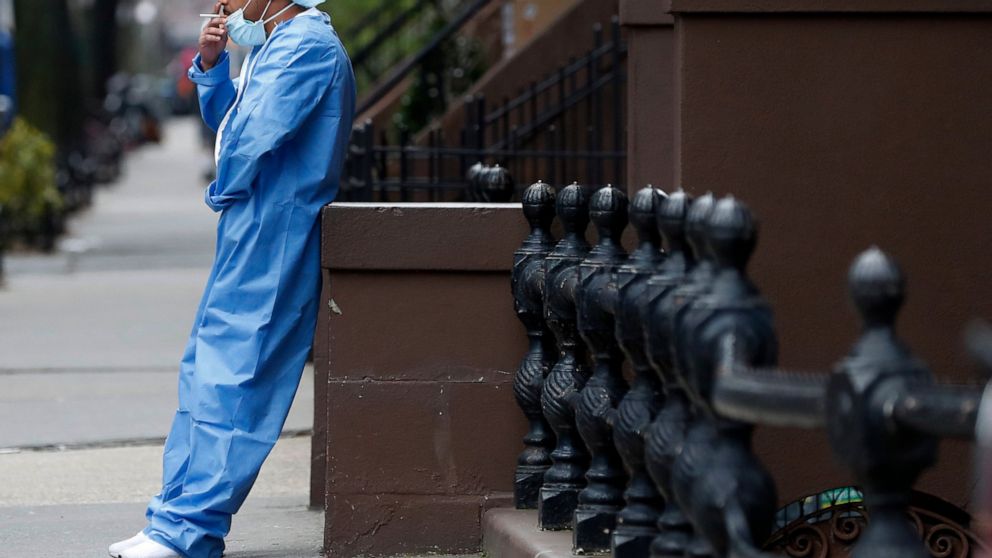Omicron is latest blow to pandemic-weary front-line workers
The surge in coronavirus cases driven by the new omicron variant is the latest blow to hospitals, police departments, supermarkets and other critical operations struggling to maintain staffing levels
December 24, 2021, 12:37 PM
7 min read
Share to FacebookShare to TwitterEmail this article
3:15
Catch up on the developing stories making headlines.
The Associated PressBOSTON -- Staff absences for COVID-19 tripled this month in London’s hospitals, and nearly 10% of the city’s firefighters called out sick.
In New York, about 2,700 police officers were absent earlier this week — twice the number who are ill on an average day. And on Cape Cod in Massachusetts, grocery worker Judy Snarsky says she’s stretched to her limit, working 50 hours a week and doing extra tasks because her supermarket has around 100 workers when it should have closer to 150.
“We don’t have enough hands. Everybody is working as much as they physically and mentally can,” the 59-year-old in Mashpee said. “Some of us have been going like a freight train.”
The worldwide surge in coronavirus cases driven by the new omicron variant is the latest blow to hospitals, police departments, supermarkets and other critical operations struggling to maintain a full contingent of front-line workers as the pandemic enters its third year.
Governments have taken steps to stem the bleeding across a range of jobs considered essential for society, from truckers and janitors to child care providers and train conductors. But nurses and other workers worry that continued staffing woes will put the public at greater risk and increase burnout and fatigue among their ranks.
Seattle Officer Mike Solan, who leads his city’s police union, said his department is down about 300 officers from its usual force of 1,350.
“It’s difficult for our community because they’re waiting for that call for help,” he said. "And then we’re at risk because we don’t have the proper safe numbers to have a safe working environment when we answer that call for help.”
Michelle Gonzalez, a nurse at New York’s Montefiore Medical Center in the Bronx, said she and her intensive care unit colleagues never truly had a break from COVID-19, and the arrival of omicron has only reawakened her post-traumatic stress.
“Prior to work, I get really bad anxiety,” she said. “If I’ve been off for two days, I will come back in a panic because I don’t know what I’m walking into.”
Countries including Spain and the U.K. have reduced the length of COVID-19 quarantines to ease staffing shortages by letting people return to work sooner after testing positive or being exposed to the virus. The U.S. did similar for health care workers only.
Meanwhile in the U.S., states such as Massachusetts have called in hundreds of National Guard members to help fill the gaps in hospitals and nursing homes, where they serve meals, transport patients and do other nonclinical work.
In Seattle, Mayor Jenny Durkan has promised to veto legislation repealing a $4-an-hour hazard pay raise for grocery workers, which has been in place for nearly a year in some major West Coast cities, including Los Angeles and Berkeley and Long Beach, California.
“Now is not the time to roll back the pay for these critical front-line workers,” the Democratic mayor said earlier this week.
Unions representing health care workers gripe that far too many hospitals failed to fill staff vacancies or to retain pandemic-weary staff.
For example, there are 1,500 nursing vacancies in New York's three largest hospitals alone, or about double the number at the onset of the pandemic, said Carl Ginsberg, a spokesman for the 42,000-member New York State Nurses Association.
“There are not enough nurses to do the job right, and so there are situations where the units have dangerous conditions, where patients are in jeopardy,” he said.
In London, the U.K.’s omicron epicenter, a wave of staff absences is hitting hospitals just as COVID-19 admissions have doubled in three weeks. The latest surge will probably persist until mid-January, officials said.
“It wouldn’t take much to cause a crisis,” said David Oliver, a consultant physician at a hospital in southeast England.
The operators of U.S. nursing homes, which were crippled by some of the deadliest COVID-19 outbreaks early in the pandemic, are among those pleading for officials to do more.







